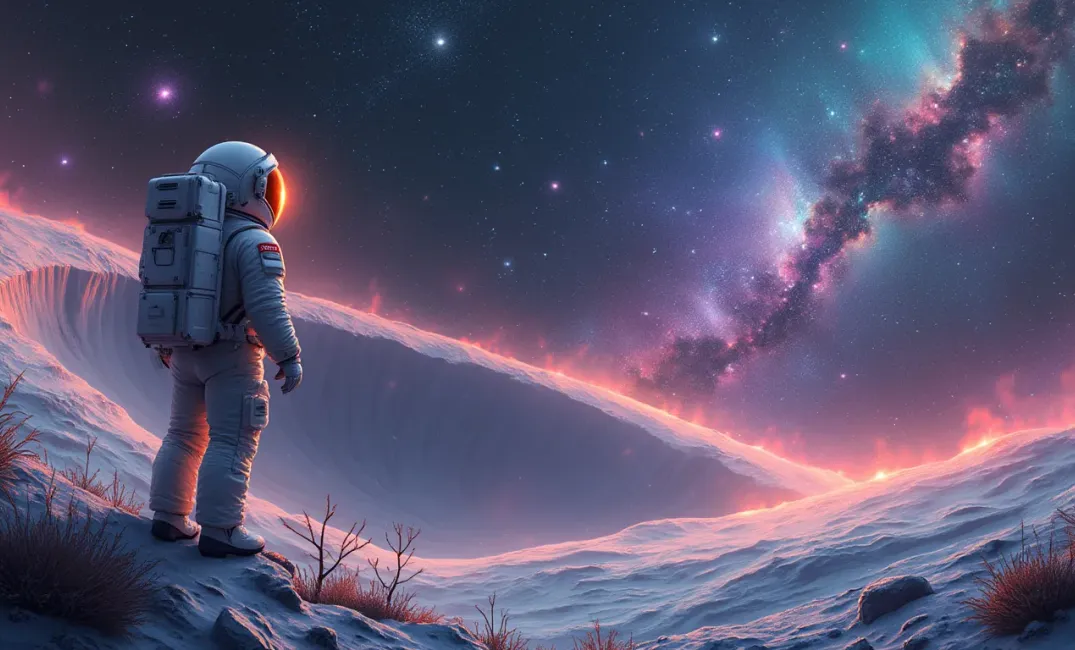Introduction: Humanity's Unyielding Quest for Knowledge
Exploration has always been a defining force of humanity, shaping cultures, economies, and technological advancements. Driven by curiosity, necessity, and ambition, exploration epitomizes the eternal human spirit yearning to understand the unknown. This legacy is intertwined with human destiny, reflecting an unyielding quest to traverse boundaries, challenge constraints, and reshape existence through discovery. This entry examines the diverse facets of exploration—from early migrations to cosmic quests—revealing how exploration has forged paths of innovation and transformation across time.
"Exploration is wired into our brains. If we can see the horizon, we want to know what's beyond." — Buzz Aldrin
Ancient Beginnings: Migrations and Discoveries
The First Migrations: Charting New Horizons
- Out of Africa: The Great Human Migration: Modern humans began migrating out of Africa around 60,000 to 80,000 years ago, spreading globally in search of resources and favorable climates, which forged pathways of adaptation and innovation.
- The Peopling of the Americas: Migration into the Americas likely occurred via the Bering Land Bridge during the last Ice Age, catalyzing unique cultural expressions across new terrains.
The Age of Maritime Exploration
- Polynesian Voyages: Navigating the Pacific: Polynesians mastered ocean voyaging over immense distances in the Pacific, using stars and ocean currents to navigate, epitomizing humanity's ingenuity.
- The Viking Expeditions: Norse Vikings embarked on expeditions across Europe and North America, showcasing their seafaring prowess and resilience as they settled territories like Iceland and Greenland.
Expansion and Discovery: The Age of Exploration
European Age of Exploration
- The Columbian Exchange: Initiated by Columbus in 1492, this era saw European powers embark on Atlantic expeditions, triggering a profound intercultural exchange of goods, cultures, and technologies.
- The Search for the Northwest Passage: European explorers pursued a maritime route through the Arctic Ocean, underscoring a relentless pursuit amid harsh conditions.
Explorations of Central and South America
- Spanish Conquistadors and the New World: Conquistadors like Cortés led expeditions that altered civilizations such as the Aztecs, bringing extensive cultural exchanges.
- Amazonian Expeditions: European exploration of the Amazon rainforest unveiled biodiversity and indigenous knowledge, inspiring future scientific inquiry.
Scientific Exploration: New Frontiers in Understanding
The Enlightenment and Scientific Exploration
- Mapping the Skies and Seas: Figures like Captain James Cook enhanced cartographic accuracy and scientific understanding through Pacific expeditions.
- The Quest for the Poles: Explorers like Shackleton braved Arctic and Antarctic frontiers, symbolizing the spirit to conquer Earth's extremes and contributing to climatology.
New Worlds and Underwater Mysteries
- Jacques Cousteau and Oceanic Exploration: Cousteau’s inventions revolutionized marine science, fostering appreciation for oceanic biodiversity.
- Deep-Sea Discoveries: Exploring the Mariana Trench revealed unique life forms, expanding understanding of Earth's biosphere.
Cosmic Endeavors: Humanity’s Reach Beyond Earth
The Space Age: Venturing Into the Final Frontier
- Sputnik and the Dawn of Space Exploration: The 1957 Sputnik launch marked the Space Age, showcasing technological prowess in extraterrestrial exploration.
- Apollo Missions and Moon Landings: The U.S. Apollo missions, especially the 1969 moon landing, represented a planet-wide quest for achievement.
Unmanned Missions and Discoveries
- Voyager Probes: Journey to the Stars: Launched in 1977, these missions explored outer planets, showing potential to extend beyond the solar system.
- Mars Exploration Rovers: Rovers like Spirit and Curiosity uncovered Martian clues about geological history, highlighting humanity's drive to uncover cosmic mysteries.
Challenges and Triumphs: Navigating Through Uncertainty
The Ethics of Exploration
- Cultural Impacts and Ethical Considerations: Exploration often caused cultural upheaval, necessitating ethical frameworks that ensure equitable benefits and preservation.
- Environmental Stewardship: Exploration poses environmental challenges, requiring practices that safeguard both Earth and outer space.
The Future of Exploration
- Interdisciplinary Innovation and Collaboration: Future exploration will harness technology and international cooperation to tackle challenges like climate change.
- Private Ventures and Public Interests: The rise of aerospace companies highlights partnerships that broaden space access and inspire innovation.
Conclusion: Exploration as Humanity's Guiding Compass
Exploration remains transformative, encapsulating the human spirit's thirst to venture beyond limits. From migrations and maritime quests to interstellar aspirations, exploration has shaped identities and technologies. As we confront contemporary complexities, exploration remains a vital compass guiding humanity toward unimagined possibilities.
"Exploration is the essence of the human spirit, a symphony of curiosity orchestrating our journey toward a boundless horizon." — Author Unknown
HISTORY, SCIENTIFIC DISCOVERY, EXPLORATION, CURIOSITY, COSMIC EXPLORATION, INNOVATION, CULTURAL IMPACTS

